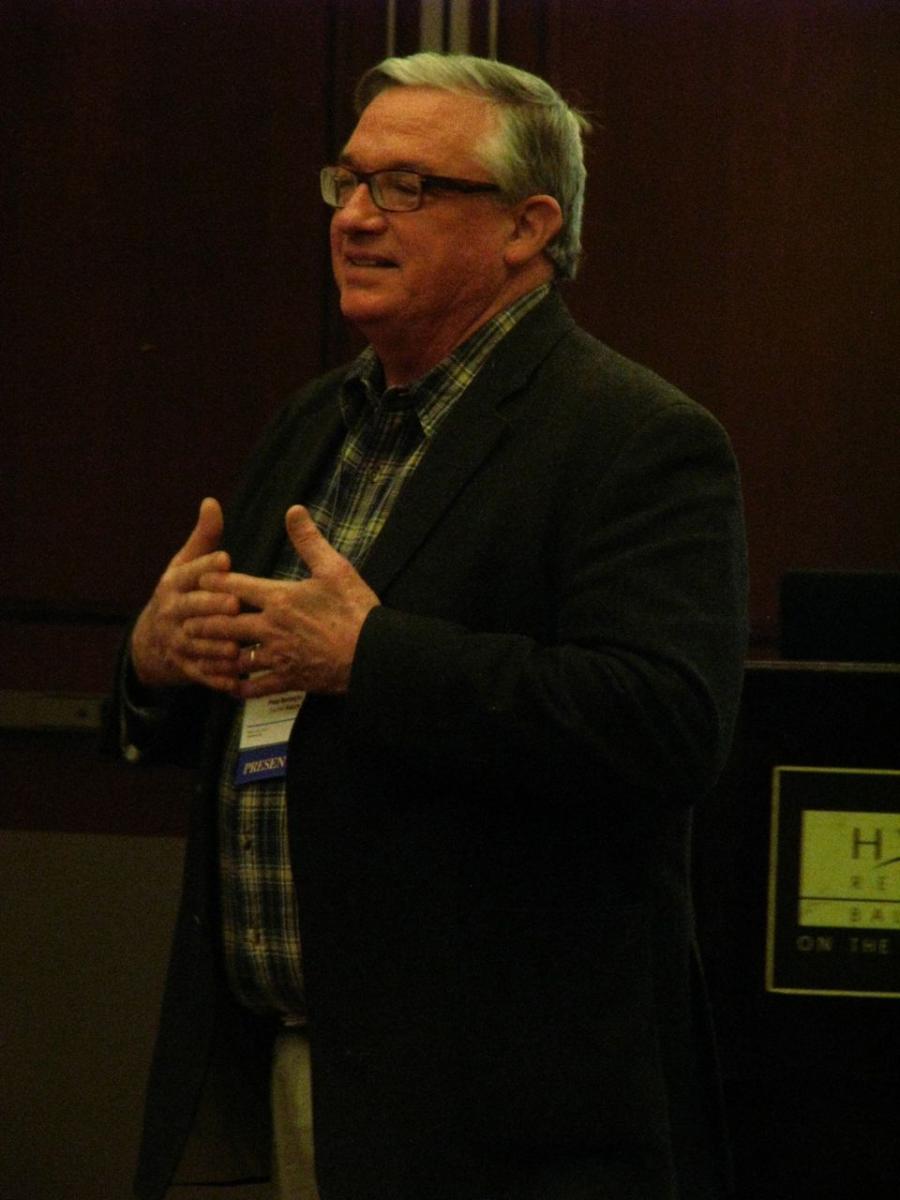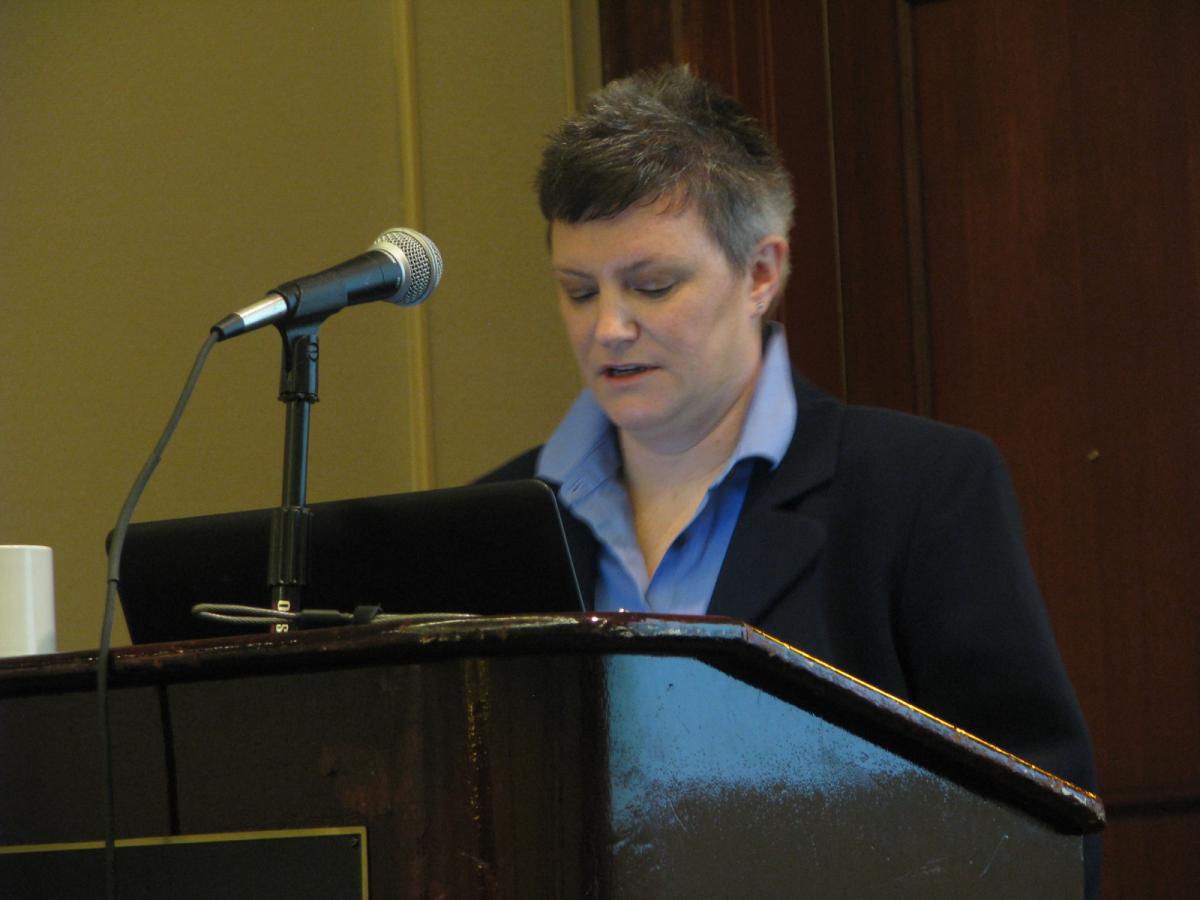![]()
By Gabriela Boscio, ACUPCC Program Associate
A large part of our work towards achieving a sustainable society is based on the connections we make and the information we share using cross-institutional platforms and events. One such event was the 9th Annual Smart and Sustainable Campuses Conference, which several representatives from Second Nature recently had the pleasure of attending. The conference, which ran from March 3-4, 2014 and was held in Baltimore’s beautiful Inner Harbor featured presentations focused on Adaptation and Resilience, Change Management and Implementation, Social Sustainability, the Built Environment and the Campus as a Learning Laboratory.
 As part of the “Adaptation and Resiliency” track, Anne Waple, Director of Resilience and Communications, and Peter Bardaglio (pictured left), Senior Advisor to Second Nature and Executive Director of Tompkins County Climate Protection Initiative (TCCPI) led a presentation titled “Preparing for a Changing Climate: Creating the Blueprint for High Impact Campus & Community Resilience”. This session focused on the new Second Nature initiative: the Alliance for Resilient Campuses (ARC) (to be launched in April!) and building critical connections between higher education institutions, surrounding communities, institutional research, and student engagement. Peter Bardaglio presented TCCPI as a concrete example of the kind of multi-sector collaboration that is needed to achieve this.
As part of the “Adaptation and Resiliency” track, Anne Waple, Director of Resilience and Communications, and Peter Bardaglio (pictured left), Senior Advisor to Second Nature and Executive Director of Tompkins County Climate Protection Initiative (TCCPI) led a presentation titled “Preparing for a Changing Climate: Creating the Blueprint for High Impact Campus & Community Resilience”. This session focused on the new Second Nature initiative: the Alliance for Resilient Campuses (ARC) (to be launched in April!) and building critical connections between higher education institutions, surrounding communities, institutional research, and student engagement. Peter Bardaglio presented TCCPI as a concrete example of the kind of multi-sector collaboration that is needed to achieve this.
Gabriela Boscio, Program Associate for the American College & University Presidents’ Climate Commitment (ACUPCC) hosted an Implementation Liaison Networking Meeting for signatories of the ACUPCC. The workshop aimed to provide a space in which personnel at signatory institutions of the ACUPCC could make connections, share success stories, and learn from each other’s experience. The meeting consisted of group discussions identifying opportunities and exploring solutions for ACUPCC implementation, including reporting challenges, leadership transitions, Climate Action Planning, greenhouse gas inventory completion, and tracking progress of mitigation and education programs.
 Anne Waple (pictured right) also organized and participated in the presentation “National Climate Assessment – Implications for Higher Education” alongside Emily Cloyd and Bryce Golden-Chen, both from the National Climate Assessment office at the U.S. Global Change Research Program. The presentation highlighted the NCA as a resource for smart and sustainable campuses across the U.S., while reviewing its major findings across climate science, impacts, and decision options. The presenters also described ways in which higher education can both benefit from and engage in this more sustained and inclusive NCA approach, including in the development of ‘indicators’ of change, impact and response, and in a sustained approach to assessment for the nation. (The third National Climate Assessment report will be released in late April, and we will provide many more resources and highlights here at Second Nature!)
Anne Waple (pictured right) also organized and participated in the presentation “National Climate Assessment – Implications for Higher Education” alongside Emily Cloyd and Bryce Golden-Chen, both from the National Climate Assessment office at the U.S. Global Change Research Program. The presentation highlighted the NCA as a resource for smart and sustainable campuses across the U.S., while reviewing its major findings across climate science, impacts, and decision options. The presenters also described ways in which higher education can both benefit from and engage in this more sustained and inclusive NCA approach, including in the development of ‘indicators’ of change, impact and response, and in a sustained approach to assessment for the nation. (The third National Climate Assessment report will be released in late April, and we will provide many more resources and highlights here at Second Nature!)
Keynote Speakers included Frances Moore Lappé, from Small Planet Institute who spoke about Cultivating an Eco-mind. Cecilia Estolano, from Estolano LeSar Perez Advisors gave a presentation titled “Universities as a Resource and Facilitator for Resiliency in Socially Vulnerable Communities”. The closing keynote, “Sustainability: An American Grand Strategy for the 21st Century”, was given by Mark Mykleby, from the New America Foundation.

Add new comment